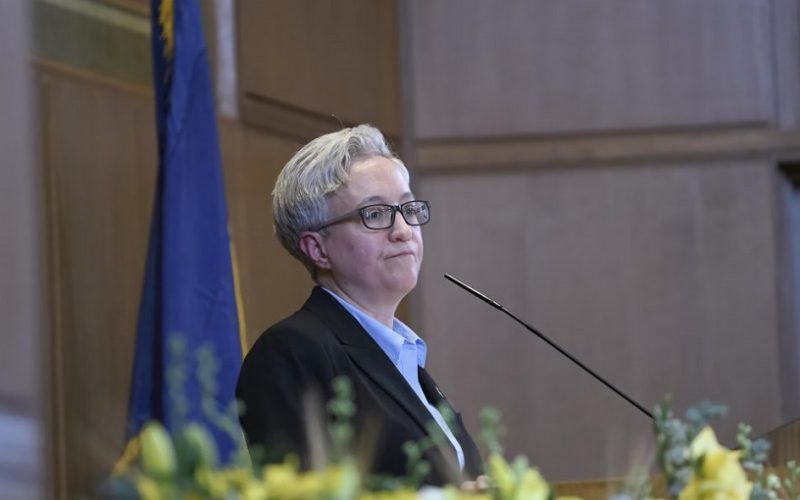Salem, OR – In her first State of the State address, Oregon Governor Tina Kotek struck a balance between frustration and optimism as she outlined the state’s ongoing challenges and the need for bold action moving forward. Delivered to a joint session of the Oregon House and Senate on January 13, 2025, the speech focused on housing, homelessness, mental health, education, and climate resilience, while emphasizing the importance of unity and persistence in addressing the state’s most pressing issues.
Kotek began her address by reflecting on Oregon’s recovery from past crises, including the COVID-19 pandemic and the devastating 2020 Labor Day wildfires. She highlighted the resilience of Oregonians, noting that despite these shared traumas, the state continues to stand strong. “Oregon is still standing, our faith in ourselves as Oregonians remains true,” Kotek said. “We have developed new skills and insights to withstand the uncertainties of tomorrow.”
Drawing on her experience as a former high school track athlete, Kotek compared the state’s challenges to the 400-meter relay, where teams pass the baton, sometimes stumbling, but always persevering. She called for continued collaboration and a focus on improving the everyday lives of Oregonians, regardless of political differences.
Housing and Homelessness
One of the primary focuses of Kotek’s address was the ongoing crisis of housing and homelessness in Oregon. Despite significant efforts, including a state of emergency declaration on her first day in office, the problem persists. Kotek acknowledged the progress made, such as the projected relocation of thousands of families from homelessness into permanent housing, but expressed frustration with the pace of change. Data from the U.S. Department of Housing and Urban Development revealed that the number of homeless individuals in Oregon had increased by 13% from 2023 to 2024, bringing the total to nearly 23,000.
“I am impatient about the pace of progress,” Kotek admitted. “So please, my friends, let’s do more. Let’s be bolder. Let’s build more housing.”
She pointed to recent successes, including the development of shelter beds and affordable homes in Clatsop County, which had the highest rate of unsheltered homelessness in the state when she took office. However, she emphasized that the ultimate goal is not just providing shelter, but enabling Oregonians to work and afford their own homes, a challenge that persists statewide.
Mental Health and Addiction Treatment
Kotek also addressed the state’s mental health and addiction treatment systems, acknowledging the overwhelming pain on Oregon’s streets and in its schools and homes. Her budget proposal includes $90 million to add treatment beds and $50 million for workforce retention and recruitment. She emphasized that while progress is being made, much more needs to be done to expand services and reduce the strain on facilities like the Oregon State Hospital, which is currently overwhelmed with patients facing criminal charges.
“The herculean efforts that community providers are making are making a difference,” Kotek said, “but we need more of them in more places.”
Education and Accountability
The governor’s speech also touched on education reform, with a focus on improving funding for schools. Kotek proposed changes to how the state calculates base funding for districts but vowed to hold schools accountable for student outcomes. She emphasized that when a district’s performance fails its students, it will not be enough to simply offer help—it will be required.
“When a district’s numbers show failure for their students, there will be help and attention,” Kotek said. “Not voluntarily requested, but required.”
Climate Resilience and Wildfires
Climate change and its impact on Oregon’s wildfire season were another key point in Kotek’s address. With the 2024 fire season resulting in the burning of more than 1.9 million acres and a $350 million cost to fight the fires, Kotek proposed setting aside $150 million from the state’s Rainy Day fund specifically for wildfire-related costs. She called this “money for a Very Very Bad Smoky Day,” a reminder of the urgent need to address the long-term consequences of climate change.
Government Efficiency
Kotek also highlighted efforts to improve the efficiency of state agencies, which have been under increased strain due to the pandemic and additional responsibilities. Since taking office, the state has reduced hiring times and staff vacancy rates by a third. The governor stressed the importance of transparency and consistency in state rulemaking to ensure that agencies operate effectively.
Transportation and Republican Response
While transportation funding was only briefly mentioned, Kotek acknowledged ongoing work to pass a statewide transportation package, which will be a major focus of the 2025 legislative session.
Republican leaders responded to Kotek’s speech with a rebuttal, criticizing her administration for driving up the cost of living in Oregon and for failing to deliver on promises made over the last decade. House Minority Leader Christine Drazan and Senate Minority Leader Daniel Bonham argued that Kotek’s approach had not solved the state’s issues, including the housing crisis, and that her policies were driving Oregonians out of the state.
“If you look at her 10 years as speaker of the House and first two as governor, what you’re faced with is abject failure,” Bonham said.
Looking Ahead
Kotek’s address painted a picture of both progress and frustration. While Oregon has made strides in tackling some of its most significant challenges, the governor’s call for bolder, faster action underscores the urgency of addressing issues like housing, mental health, and climate change. As she navigates the complexities of leadership, Kotek remains focused on the long-term goal of improving the lives of all Oregonians, despite the difficult road ahead.











